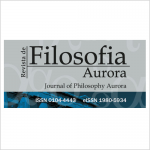MODERNITY AND HUMAN RIGHTS: BEYOND A SIMPLE ASSOCIATION
V. 28, N. 43 (2016) • Revista de Filosofia Aurora
Autor: Leno Francisco Danner
Resumo:
Beginning with the Jürgen Habermas’ reconstruction of a normative model of European cultural modernity as basis to a contemporary notion of epistemological-moral universalism as condition to critic, to integration and to intervention, which leads to the affirmation that democracy and human rights represent the modernity’s fundamental legacy, I will discuss that such theoretical reconstruction only can be possible from a historical-sociological blindness which is based on the separation between a normative notion of European cultural modernity and the Realpolitik of colonialism – just from this theoretical-political standpoint it is possible to sustain a universalistic normative paradigm which is capable to ground the criticism, the integration and the intervention of all social-cultural contexts, which means that modern culture and normativism can serve as medium and guide of all particular cultures, at least in a strong way. Against that optimistic role of the Habermasian normative model of European cultural modernity, I will argue that democracy and human rights as modernity’s legacy have basically two tasks in the contemporary Realpolitik: first, to restrain the modernity’s totalizing tendency to rationalization and to globalization, i.e. its movement of assimilation of all cultures and societies in a model of epistemological, cultural and economic universalism; and to ground an international institutional politics based on the social-economic reparation for the colonialism, which implies in a universalistic extension of the social rights to all people in the world (for example, the Philippe van Parijs’ idea of basic income).
DOI: http://dx.doi.org/10.7213/aurora.28.043.DS05
Texto Completo: https://periodicos.pucpr.br/index.php/aurora/article/view/aurora.28.043.DS05

Revista de Filosofia Aurora
A Revista de Filosofia: Aurora (Qualis A2) é uma publicação quadrimestral do Programa de Pós-Graduação em Filosofia da Pontifícia Universidade Católica do Paraná (PUCPR). Vem divulgando, desde 1988, resultados de pesquisas com o intuito de colaborar com a formação e atuação de filósofos e demais profissionais das áreas afins. A Revista de Filosofia Aurora (Journal of Philosophy Aurora) publica artigos científicos, resenhas e entrevistas adotando o processo de revisão (peer review) entre os membros do Conselho Editorial e da comunidade científica especializada, em sistema duplo de revisão anônima (blind review), ou seja, tanto os nomes dos pareceristas quanto os dos autores permanecerão em sigilo.
O título abreviado da revista é Rev. Filos. Aurora e deve ser utilizado em bibliografias, referências, notas de rodapé e legendas bibliográficas.
